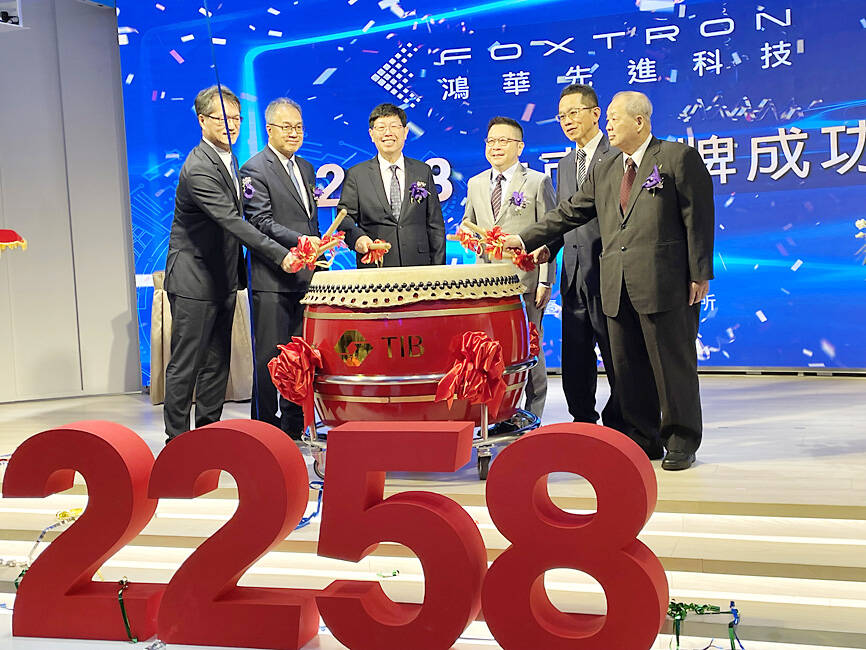Shares of Foxtron Vehicle Technologies Co (鴻華先進), an electric vehicle joint venture between Hon Hai Precision Industry Co (鴻海精密) and Yulon Motor Co (裕隆汽車), yesterday fell 2.7 percent on their debut on the Taiwan Stock Exchange’s (TWSE) new trading platform — the Taiwan Innovation Board.
Foxtron is the 1,000th listed company on the nation’s main bourse and the eighth firm trading shares on the Innovation Board, TWSE said in a statement.
The stock dropped at the open from its initial public offering price of NT$50, and at one point fell to as low as NT$45.5, before paring some losses to close 2.7 percent lower at NT$48.65, underperforming the TAIEX’s 0.01 percent rise.

Photo: CNA
Established in 2020 with paid-in capital of NT$17.41 billion (US$549.94 million), Foxtron is 49.92 percent owned by Hon Hai and 47.96 percent held by Yulon subsidiary Hua-Chuang Automobile Information Technical Center Co (華創車電), with the remainder held by other investors.
Over the past three years, the company has developed four electric vehicle (EV) prototypes: the Model B crossover sports utility vehicle, Model C sports utility vehicle, Model E luxury sedan and the Model T bus.
Unique Satellite TV quoted Foxtron CEO Andy Lee (李秉彥) as saying at yesterday’s listing ceremony that the company is starting production of the Model C this quarter and expects to begin deliveries of the model in January next year.
Foxtron hopes to complete the delivery of 8,000 to 9,000 vehicles in the first half of next year, the company said.
The Model B is expected to start volume production in the fourth quarter of next year, while the delivery of Model T buses would exceed 100 units this year, up from 20 to 30 last year, it said.
“Compared with traditional automakers, which often spend five to six years from design to mass production, Foxtron has built four EV models in less than three years, at a faster speed to popularize electric cars in Taiwan and better serve local customers,” Foxtron chairman Young Liu (劉揚偉) said at the listing ceremony yesterday.
Liu is also chairman of Hon Hai, a major Apple Inc supplier known internationally as Foxconn Technology Group (富士康科技集團).
Liu touted Foxtron’s advantages in speed, quality and cost efficiency in vehicle production, but said that “complete vehicle design” is the biggest challenge for the firm. “We would continue on this path,” he said.
Liu said Foxtron would use Taiwan as its production base and leverage Hon Hai’s “contract design and manufacturing service” (CDMS) and “build operate localize” (BOL) business models to enter mainstream markets such as North America and Southeast Asia, with electric passenger cars expected for North America initially and electric buses for Southeast Asia.
Foxtron lost NT$895 million in the first three quarters of this year, more than doubling its losses from NT$396 million a year earlier, with losses per share of NT$0.56. The company posted losses per share of NT$0.87 last year and NT$0.51 in 2021.
Cumulative sales in the first 10 months of the year rose 196.15 percent year-on-year to NT$764.7 million, company data showed.

South Korea’s equity benchmark yesterday crossed a new milestone just a month after surpassing the once-unthinkable 5,000 mark as surging global memory demand powers the country’s biggest chipmakers. The KOSPI advanced as much as 2.6 percent to a record 6,123, with Samsung Electronics Co and SK Hynix Inc each gaining more than 2 percent. With the benchmark now up 45 percent this year, South Korea’s stock market capitalization has also moved past France’s, following last month’s overtaking of Germany’s. Long overlooked by foreign funds, despite being undervalued, South Korean stocks have now emerged as clear winners in the global market. The so-called “artificial intelligence

NEW IDENTITY: Known for its software, India has expanded into hardware, with its semiconductor industry growing from US$38bn in 2023 to US$45bn to US$50bn India on Saturday inaugurated its first semiconductor assembly and test facility, a milestone in the government’s push to reduce dependence on foreign chipmakers and stake a claim in a sector dominated by China. Indian Prime Minister Narendra Modi opened US firm Micron Technology Inc’s semiconductor assembly, test and packaging unit in his home state of Gujarat, hailing the “dawn of a new era” for India’s technology ambitions. “When young Indians look back in the future, they will see this decade as the turning point in our tech future,” Modi told the event, which was broadcast on his YouTube channel. The plant would convert

‘SEISMIC SHIFT’: The researcher forecast there would be about 1.1 billion mobile shipments this year, down from 1.26 billion the prior year and erasing years of gains The global smartphone market is expected to contract 12.9 percent this year due to the unprecedented memorychip shortage, marking “a crisis like no other,” researcher International Data Corp (IDC) said. The new forecast, a dramatic revision down from earlier estimates, gives the latest accounting of the ongoing memory crunch that is affecting every corner of the electronics industry. The demand for advanced memory to power artificial intelligence (AI) tasks has drained global supply until well into next year and jeopardizes the business model of many smartphone makers. IDC forecast about 1.1 billion mobile shipments this year, down from 1.26 billion the prior

People stand in a Pokemon store in Tokyo on Thursday. One of the world highest-grossing franchises is celebrated its 30th anniversary yesterday.